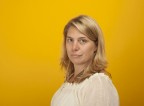Kristin's Expert Q+A
 What factor plays a bigger role in a new project – lack of time or a small budget?
What factor plays a bigger role in a new project – lack of time or a small budget?
Short timelines are a bigger problem. The normal reaction to meeting a short timeline is to throw lots of resources at it. And the result is usually lots of people working on lots of little pieces without a clear vision on the bigger picture. A small budget encourages efficiency, but doesn’t compromise thinking or communication time.
What was your first job in the design field?
I started off working with rapid prototyping machines. That is actually how I found out about design. I was helping engineers and industrial designers make short-run products, using rapid prototyped parts. So, I had to figure out how to investment cast or electroplate those parts. Eventually, I decided I would rather be on the end that dreamt up the new products.
What’s the strangest thing that has happened to you during your design career?
I get to do lots of strange things on a daily basis. Sometimes it involves sawing the tops off ketchup containers or putting cameras inside water bottles but my favorite experience was going on an early morning milk delivery run in India. It made me realize how much I did not know about how products are merchandised and sold in other countries.
What is your favorite design tool? Why?
That would either be double-stick tape or the shower. Double stick tape is essential to any mock-up process. I think you could pretty much Frankenstein together any package you can imagine with the right raw materials and double-stick tape. And much of my work relies on my ability to quickly mock-up an idea, put it in front of people to see how they use it, then iterate based on what I learn. The shower is where all of those gnawing problems, that I never get enough time to focus on between nine and five, turn into ideas.
Can you tell us a little more about your Conference topic? What personal or professional experiences led you to this topic?
“Just Add Water” came about because Heather and I noticed that Continuum had several different projects going on, across drastically different categories, that all involved concentrates. It seemed really odd, at the time, because normally our work focuses on the leading edge of what is technically possible and concentrates felt like they were the exact opposite - old and gross. But, the more we thought about it, it occurred to us that each project independently came to the decision to pursue concentrates for some fairly consistent reasons. It was those reasons that were most interesting to us.